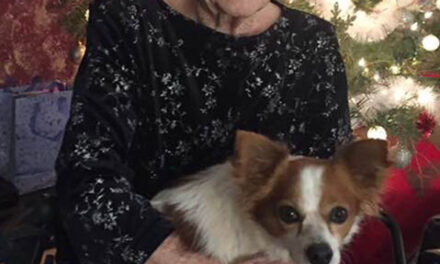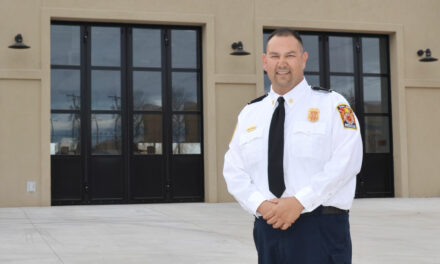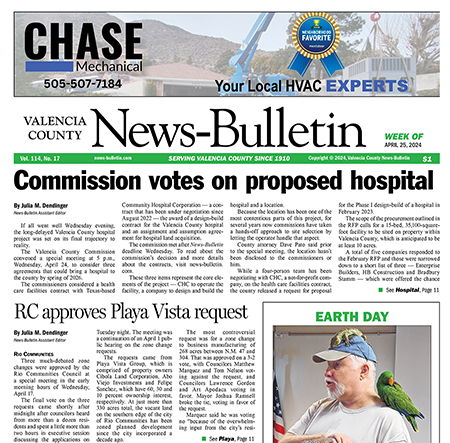LOS LUNAS — Imagine dropping behind enemy lines with a group of about five to seven marines in the dense forests of Vietnam, tracking enemy movement and trying to locate enemy outposts.
Imagine leading those men, with gunfire coming from every direction and with not much visibility. You fire back because you have to, because you have to protect the next man over — and yourself.
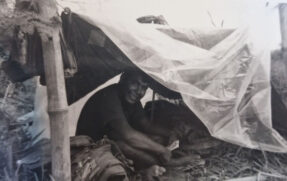
Chet Pino sits under a makeshift tent while stationed in Vietnam. Pino, a Marine veteran, says as a platoon commander, he and his team traveled the thick jungles of Vietnam looking for enemy movement.
Photo courtesy of Chet Pino
Now imagine leading those men into battle as platoon commander of a recon battalion, dropping in on helicopters and leaving the same way — if at all — and in those weeks and months fighting you come so close that hand-to-hand combat was inevitable.
That was Chet Pino’s life during the Vietnam War, and talking about those moments can be tough.
In fact, Pino says it’s rare for veterans who’ve seen combat to open up about some of those stories. Those who do, it’s for one of two reasons: to gloat or to help people understand that these moments in time were life-altering experiences.
“You don’t find too many guys — too many serious Vietnam veterans that are willing to talk,” Pino says. “What I found out and what I realized is that all the ones who do all the talking and all the bragging and the ‘I did this, I did this, I was here and there’ maybe they did, but most probably didn’t.
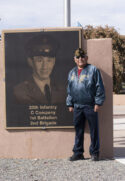
Chet Pino, a U.S. Marine veteran, stands next to the memorial for Daniel D. Fernandez at the Los Lunas park named after the local war hero Medal of Honor recipient.
Matthew Narvaiz | News-Bulletin photo
“Most of us who were probably involved directly with enemy contact and serious ambushes, we don’t really like to talk about that a whole lot.”
Pino, who spent a little more than 20 years in the service, began his career as a marine in 1969 when he decided to join on his own volition. He had graduated from Grants High School, and was a member of the Laguna Pueblo. He was raised by his grandparents for the latter years of his childhood, and eventually graduated from the New Mexico Institute of Mining and Technology with a degree in petroleum engineering.
That led him to his first job in Kansas, where he worked for a gas and oil company. He enjoyed the job, and he wasn’t initially drafted for the war in Vietnam due to an educational deferment, something he says the government made for those working in “critical occupations.”
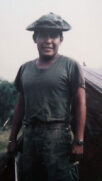
Chet Pino, a platoon commander, poses for a photo while stationed in Vietnam during the Vietnam War. The photo was taken in either 1969 or 1970.
Photo courtesy of Chet Pino
But he knew he wanted to serve his country — many in his family had served before — and two years into working for the company in Kansas, he decided it was the right time to enlist.
“Ever since high school — and living with my grandparents on the reservation — my uncles were in the service. One was in the Army, and one was in the Navy; they were both Korean War veterans. So I’d always thought that I would be in the service,” Pino says. “That seed was planted in the back of my head.”
Little did Pino know, however, joining the ranks of the U.S. Marine Corps would turn into something of a career. Originally, his plan was to come back to the oil and gas company after two years since they promised him his job back. Then two years became four, and four became six.
So after his 13 months in the thick jungles of Vietnam — he had originally arrived there in 1969 — he came back to the states and was stationed at Twentynine Palms base in California.
He didn’t just want to sit around, however; he wanted to do something more, like maybe fly a plane.
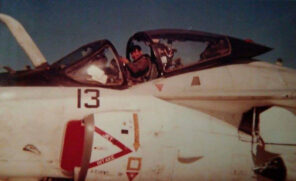
Chet Pino, who joined flight school after his time in Vietnam, poses for a photo in an A-6 plane back in the early 1970s.
Photo courtesy of Chet Pino
So Pino, who had originally qualified for flight school while in Quantico, Va., during his officer candidates school training prior to heading to Vietnam, managed to again get reapproved for flight school, this time in Pensacola, Fla.
The reason Pino didn’t take his first shot at flight school during OCS training was because he wanted his experiences to mesh off one another. If he entered battle in Vietnam, calling in air strikes every so often, then maybe that would help him as a pilot, who one day might be the person dropping them. It was a calculated move on his end.
“And I say, you know, if I’m going to fly an airplane, I should probably know what the guys in the ground are talking about,” Pino says. “So that’s why I went to Vietnam.”
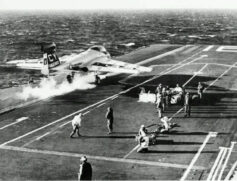
A photo of one of the planes Pino flew during his time in the marines. The plane is either an A-6 or an EA-6B, both of which were considered recon planes.
Photo courtesy of Chet Pino
Pino spent about two years flying various planes until he received his pilot wings in 1972. Then he began to specialize in flying certain planes, such as the A-6 and then eventually the EA-6B, “which is an electronic intruder, an electronic airplane that deals firmly with recon, electronic reconnaissance, jamming radars and stuff.”
That led Pino to VMCJ-2, a marine squadron based out of Cherry Point, N.C. Eventually, the squadron split and some of those pilots went to VMAQ-2, which he remained part of until his retirement in 1988.
Pino didn’t fly much after that as there weren’t any wars to do so. Pilots, then, took desk jobs at headquarters.
Still, his career took him everywhere — from Camp Pendleton to An Hoa to Pensacola and many other places.
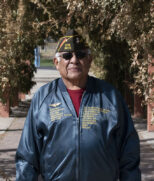
Chet Pino, the commander at VFW 9676 at Daniel D. Fernandez Park, stands in front of a walkway at the park on Monday, Nov. 2.
Matthew Narvaiz | News-Bulletin photo
Pino doesn’t regret his time in the Marine Corp, and he credits much of who he is now back to those roots. He is the commander at the Daniel D. Fernandez VFW Post 9676 in Los Lunas, a position he’s held for more than two years.
It isn’t exactly Pino’s goal to get youngsters to join the service. He said, for the most part, the service is for those who want it. For those most interested, speaking to a family member is a good starting point; and more than anything, Pino said, you have to be OK with your career not taking each turn you anticipate.
“My advice is see if you have some family or siblings or they have joined the service,” Pino says. “You know, you might spend a little bit of time talking to them, and get an idea of what their branch of the service involves.”
